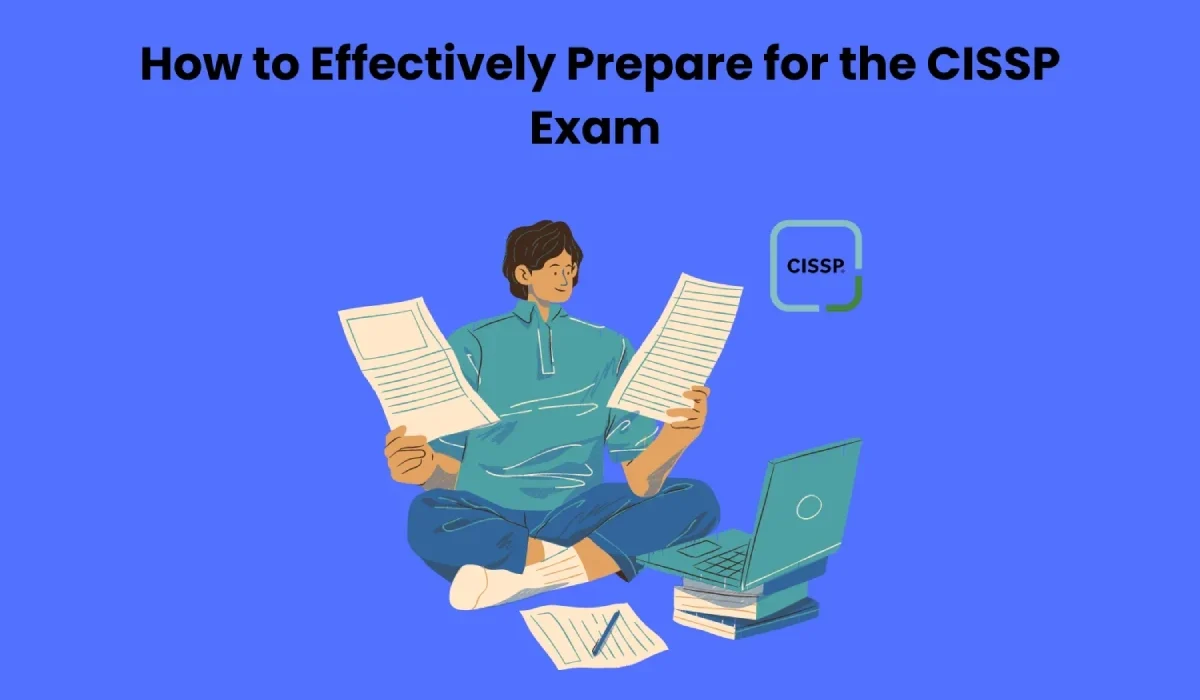The CISSP (Certified Information Systems Security Professional) certificate is one of the most important for information security professionals. Experts in cybersecurity from the International Information Systems Security Certification Consortium (ISC) are the brain behind it. To be eligible for this certification, you must be able to develop, install, and manage the company’s software, hardware, and operating systems in addition to IT networks.
In the CISSP Training course, you will learn step-by-step how to set up an Information Security Management System in any company. The Certified Information Systems Security Professional (CISSP) exam requires a comprehensive approach that includes theoretical knowledge and practical skills. To succeed, candidates must undergo rigorous training and use effective study resources like a CISSP Study Guide. This blog explores strategies for preparing for the CISSP exam, emphasising the importance of a quality study guide.
Table of Contents
- What is CISSP Exam?
- How to build a strong foundation?
- CISSP study guides and Training
- Techniques to master CISSP Exam
- Conclusion
What is CISSP Exam?
The (ISC)² recommends CISSP certification for experienced cybersecurity practitioners in roles such as CIO, IT manager, security systems engineer, analyst, manager, auditor, security architect, consultant, and network architect. Preparation can be achieved through self-study, CISSP practice books, study guides, online exams, and many candidates enrolling in CISSP training courses.
The six-hour CISSP exam has 250 multiple-choice questions and sophisticated, creative questions that assess a candidate’s comprehension of the eight areas of the (ISC)2 Common Body of Knowledge (CBK). The following are the CBK domains:
- Security and Risk Management (15% of exam)
- Asset Security (10%)
- Security Architecture and Engineering (13%)
- Communication and Network Security (13%)
- Identity and Access Management (13%)
- Security Assessment and Testing (12%)
- Security Operations (13%)
- Software Development Security (11%)
The results are computed as a scaled score, where passing requires a score of at least 700 out of 1,000 points.
The CISSP test is available in the following languages: English, German, Spanish, Japanese, Korean, Simplified Chinese, and a version for the blind. Pearson VUE administers the certification exam, which is held in Pearson VUE test locations.
CISSP certification requires an endorsement from a current certification-holder, validating work experience. It takes nine months to find an endorsement, and if unable to find one, (ISC)² may act as an endorser. This ensures completion of the necessary work experience for CISSP certification.
How to build a strong foundation?
CISSP certification requires work experience, education, and professional credentials. Candidates can have five years of relevant experience or four years if they have a related undergraduate degree or an (ISC)²-approved credential. If not meeting these requirements, they can become an Associate of (ISC)², who must fulfil work experience requirements before becoming fully certified.
- Get Familiar with the exam: Gather information from the (ISC)² official website. Understand course content, including domains, prerequisites, and exam details.
- Develop a strategy: Determine how to quickly gain information and manage time accordingly.
- Use study materials: Consult the (ISC)² CISSP official study guide, webinars, white papers, boot camps, etc.
- Prepare study notes: Write summaries or bullet points to aid in retaining concepts and understanding a topic.
- Practice as much as possible: Take the CISSP practice test after studying to identify areas of improvement.
- Refresh knowledge through training: Enroll in online training classes led by security professionals.
- Join a study group: Discuss concepts and learn more from others.
To prepare for the CISSP exam, consider using available resources and taking your preparation seriously. The ISC2 exam holds significant respect in the industry, so access to free online documentation and connecting with others in the ISC2 Study Group on Community can help ensure success.
CISSP study guides and Training
CISSP All-In-One Exam Guide by Shon Harris and Fernando Maymi
- The top CISSP training resource, based on the 2015 CBK domains.
- Includes exam tips, sample questions, and over 1,400 practice questions.
CISSP Study Guide by Eric Conrad, Seth Misenar, and Joshua Feldman
- Provides comprehensive coverage of the 2015 CISSP CBK domains.
- Includes learning and hands-on modules, definitions, exam objectives, terms, and exam “gotchas.”
- Includes a self-test appendix and two practice exams.
Official (ISC)² Guide to the CISSP CBK, Fourth Edition by Adam Gordon
- The official (ISC)2 sanctioned CISSP study guide.
- Focuses on mastery of core competencies.
- Expected to be updated to reflect the new 2018 CBK domains.
CISSP For Dummies, Sixth Edition by Lawrence C. Miller and Peter H. Gregory
- Covers the 2018 CISSP CBK domains.
- Includes expert exam prep guidance, a 60-day study plan, online test questions, flashcards, and exam day tips.
(ISC)2 CISSP: Certified Information Systems Security Professional Official Study Guide, Eighth Edition by Mike Chapple, James M. Stewart, and Darril Gibson
- Updated to cover the 2018 CISSP CBK domains.
- Includes six practice exams, over 1,400 flashcards, and a searchable glossary.
(ISC)2 CISSP Official Practice Tests, Second Edition by Mike Chapple and David Seidl
Features 1,300 practice questions, including 100 domain-specific questions, with detailed answers and explanations.
CISSP Practice Exams, Fourth Edition by Shon Harris and Jonathan Ham
- Companion to the CISSP All-in-One Exam Guide.
- Includes over 1000 practice test questions.
Techniques to master CISSP Exam
CISSP exam success is not impossible but requires strategic planning and an understanding of complex cybersecurity scenarios. The exam is designed for seasoned professionals with typically five years of full-time, paid work experience in two or more CISSP domains. However, a workaround called the ISC2 Associate route allows you to pass the exam without the required experience. This involves being designated as an ISC2 Associate instead of earning the CISSP title outright.
Over time, you can transition to a full CISSP credential. Having foundational knowledge, such as CompTIA Security+ or CCNA Security, can provide a platform for understanding CISSP materials. However, without direct experience, the journey to CISSP exam success requires more effort, as it involves understanding complex cybersecurity scenarios, decision-making processes, and risk management strategies at a granular level.
Conclusion
The CISSP certification is highly regarded in the information security industry and is recommended for experienced cybersecurity professionals. The certification exam covers eight knowledge domains and requires a comprehensive understanding of information security management systems. Candidates can prepare for the exam through self-study, training courses, and using study materials such as CISSP study guides. A strong foundation through work experience, education, and professional credentials is essential for CISSP certification. It is important to familiarise oneself with the exam content, develop a study strategy, and practice as much as possible. Utilising available resources and taking preparation seriously will increase the chances of success in the CISSP exam.






Leave feedback about this